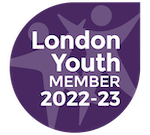Stop and Search Training with Sayce-Holmes Lewis
Last week the team did a stop and search training session delivered by Sayce Holmes-Lewis, sports coach, activist, and the founder and CEO of mentoring organisation Mentality. We had the privilege of Sayce’s expertises and knowledge, to take us through some history of stop and search and what rights people have.
Did you know that almost half of all stop and searches take place in London? And unfortunately these encounters are often negative. Sayce also has a long line of negative experiences with stop and searches, so has now made it his mission to revolutionise the way the police interact with young people and particularly black people. He believes in empowering people with the knowledge to navigate these often-intimidating situations, and in training police officers on how to interact with people in a positive way and release any biased judgements they may make.
What is Stop and Search?
There are two different types of search. Stop and account is when police officers stop to ask you questions such as where you’re going and what you’re doing in the area. You don’t have a legal obligation to answer any questions and if you don’t then this alone can’t be used as a reason to search or arrest you.
If they detain you, this then becomes a stop and search. Stop and search is the right of Police Officers to stop anyone that they have reasonable grounds to believe is in possession of an illegal item, such as drugs and weapons or stolen property.
Why is it an Issue?
The problem with this definition is that it’s very ambiguous; what ‘reasonable grounds’ are can be interpreted very loosely, and used by officers to exploit their power. This has led to a bias in stop and search cases, and police often give unjustified reasons for stopping a young person, for example “you look like a criminal”.
Between April 2019 and March 2020 there were 6 stop and searches for every 1,000 white people, compared with 54 for every 1,000 Black people. We explored this huge gap with Sayce, and he took us through the history of why hostility has built between young people – young Black people in particular – and the police. There has been a history of injustices and unresolved issues, fuelled by racism and bias, leading to a cycle of mistrust and negative perceptions of the police.
What Can We Do?
The team discussed the importance of building relationships between people and the police, and how we can start to bridge the gap between the two groups to form some kind of understanding and respect on both sides. Sayce believes in finding common ground and using people power to make sure that officers are held accountable and carry out their searches respectfully.
It’s also so important to know what your rights are, so that you can hold police officer’s to account and encourage them to carry out the search in the correct way, rather than the too often misleading way many do. The team went through what our rights are, and did some role playing to practice navigating these situations.
A summary of these can be found on our Instagram.
If you’d like more information, Y-stop.org is a great resource, and they have an app where you can record stop and searches and access other useful information.
Thank you to Sayce for providing us with this information and for delivering us a really detailed and informative training session. We learnt so much and feel so much more empowered to advise and support our young people with this issue.


